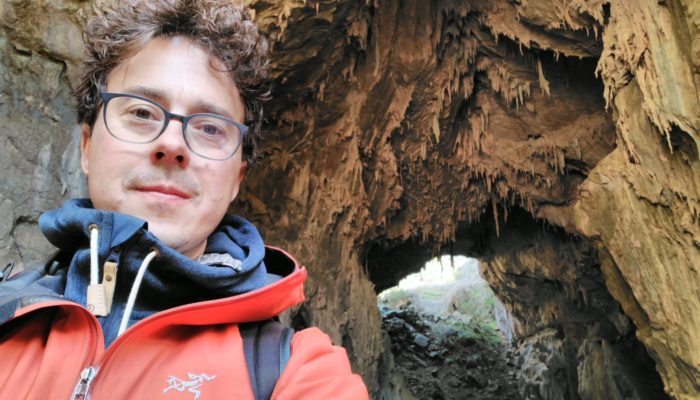
Andreas Hartmann makes a point to attend Hofer Filmtage – or the Hof International Film Festival – every year to keep up a tradition he started when he was 12. As a professor, he sets down research to make the yearly pilgrimage to his German hometown to visit with his best friends and family. This year, he couldn’t completely separate from work. After getting out of a film, he got a note saying that he had been awarded the EGU Arne Richter Award for Outstanding Early Career Scientists for the Division on Hydrological Sciences.
He was doing something he loved when he found out that the work he loved was being recognized.
When he receives good news, he likes to hold on to it for a few hours. To cherish the good news before sharing it with his colleagues and the social media sphere. Then he will happily head to the pub for a celebratory drink. This time he was eager to celebrate.
Dealing with obstacles
After talking about how to celebrate success, I asked how he deals with rejection. “I go out and distract myself for a night.” When dealing with obstacles as an early career scientist, Andreas said, “I had my first paper rejected twice and I wondered if academia was for me.” But he noted that it was the support of those around him and his mentors that kept him going, particularly from Dr. Alon Rimmer, Drs. Jens Lange and Markus Weiler during his Ph.D. at Freiburg University, Drs. Thorsten Wagener and Ross Woods, and Dr. Tom Gleeson during his post-docs at University of Bristol and McGill University, respectively.
He goes back to Weiler’s advice on being successful, “You have to learn to enjoy the good experiences and not fall into the bad experiences.” Andreas hopes that he provides that guidance to his own students. He makes sure that he reminds his students who are receiving feedback for a proposal or paper that “these [reviews] are being done by people that have flaws and strengths. They may focus on your strengths or weaknesses. Maybe they just don’t agree with your methods. Maybe they’re having a bad day. Maybe you’re still having to prove yourself if you don’t have a reputation, yet. Understand that your own value is not in this one rejection. Criticism is hard to not take personally, but your work is not all that you are.”
He emphasized that one obstacle doesn’t make him as a mentor think any less of his students. Like Dr. Alon Rimmer did for him, he wants to support his students’ growth through more than just words, but through actions to make sure that they know that they are “good enough, that I know them and they will be fine”.
Maintaining a work-life balance
With the pressure to succeed, when asked about how to maintain a work-life balance, Andreas encouraged the importance of exercise. “Being out in nature helps compensate for my time spent in my office. While I’m not running half marathons like I was during my Ph.D., I still run, cycle, ski, snowboard, and go to yoga often. That and I’ve realized the importance of taking time for friends and family.” As he’s grown throughout his career, he has contributed greatly to the field of hydrology and has found time to have balance outside of the lab.
He made sure to take his own advice during his transition from being a Ph.D. student to a post-doc to a lecturer to his current position as a junior (or assistant) professor at Freiburg University. He lamented that the first few months to a year of every time he took a new position was very hard, “Initially, you’re very excited and then everything happens so quickly that stress builds up, but it’s always something that you can overcome. Sometimes everything is frustrating as you figure out how to re-evaluate your priorities with your new responsibilities and freedom. It’s hard without training, but you find your stride and comfort with your new situation. I’m still contributing to science now, but it looks very different than when I was in grad school. I often wondered if I was doing enough and now make sure to organize my time well to make sure that I’m as productive as I can be.”
Now, he’s found his stride. His hard work has been recognized by grant agencies and as an EGU Outstanding Early Career Scientist. Moreover, his obvious passion and excitement for his work has inspired brand new early career scientists to take risks, have fun, and explore in science and succeed as a scientist.
 This interview was done by Caitlyn Hall (she/her), a Ph.D. student at Arizona State University and EGU HS ECS Representative. Her current research focus is promoting sustainability and natural hazard resilience using bacteria to reduce damage from earthquake-induced liquefaction. She works with industry, community, and government leaders to develop best-fit technical and policy solutions to best-address a community’s challenges and values. Her other research focuses include controlled environment agriculture, sustainable use of resources for urban farming, and using biochemical methods to remediate oil-contaminated soil. For fun, Caitlyn spends her time rock climbing and trail running.
This interview was done by Caitlyn Hall (she/her), a Ph.D. student at Arizona State University and EGU HS ECS Representative. Her current research focus is promoting sustainability and natural hazard resilience using bacteria to reduce damage from earthquake-induced liquefaction. She works with industry, community, and government leaders to develop best-fit technical and policy solutions to best-address a community’s challenges and values. Her other research focuses include controlled environment agriculture, sustainable use of resources for urban farming, and using biochemical methods to remediate oil-contaminated soil. For fun, Caitlyn spends her time rock climbing and trail running.
Edited by Maria-Helena Ramos
